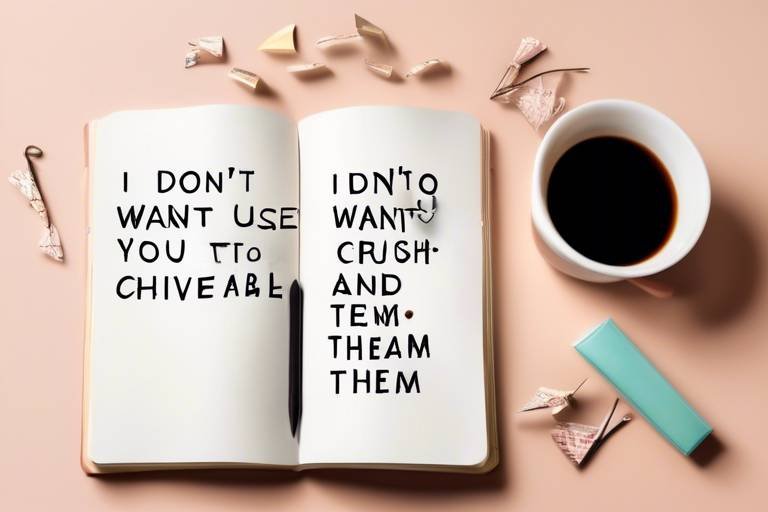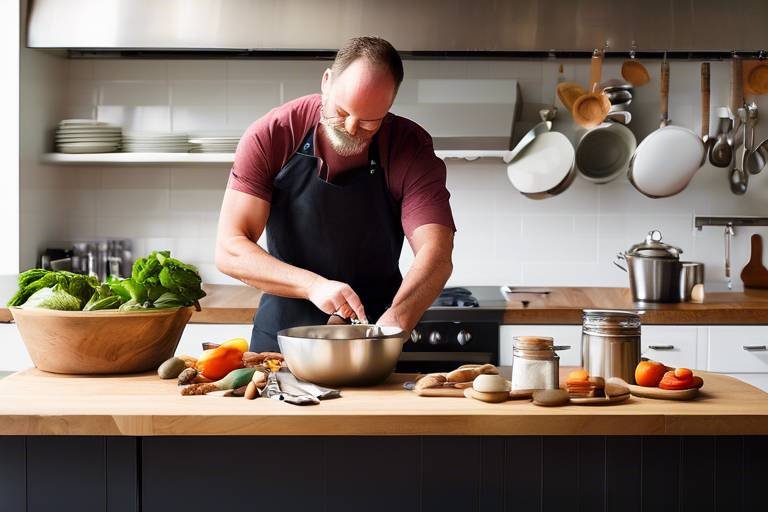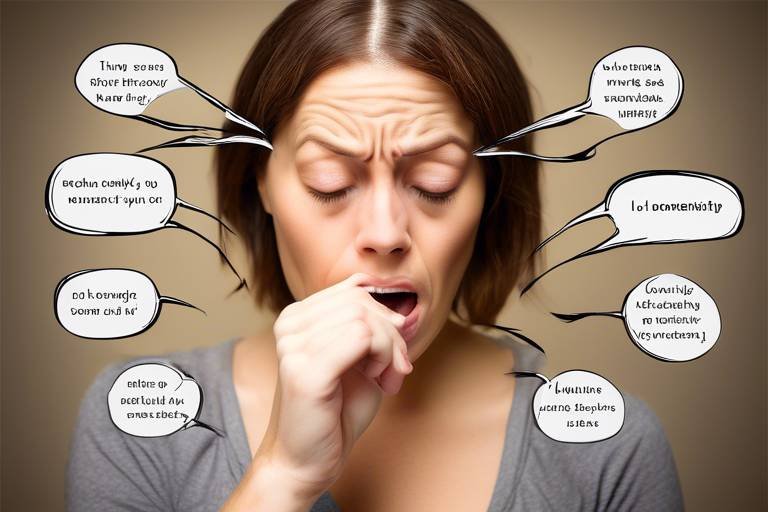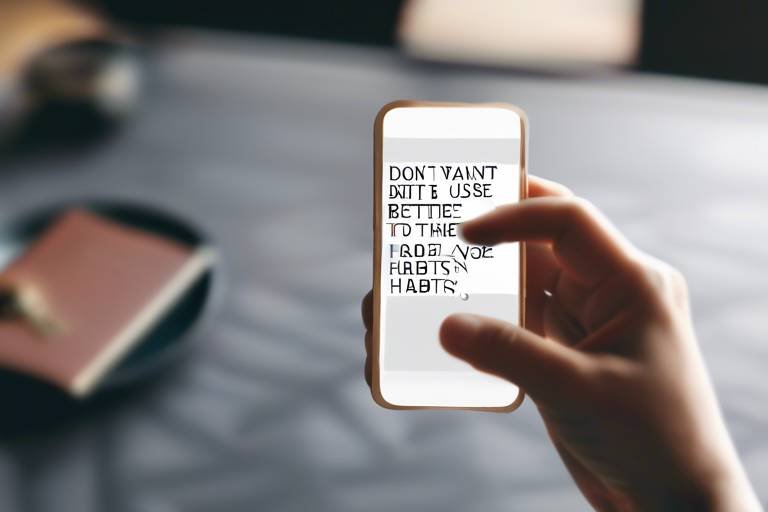How to Simplify Your Life - Minimalism Tips
Living in a world filled with constant noise and distractions, it's easy to feel overwhelmed and burdened by the complexities of modern life. However, there is a growing movement towards simplifying our lives through the principles of minimalism. By embracing minimalism, you can declutter your physical and mental space, prioritize what truly matters, and find a sense of peace and contentment amidst the chaos.
Minimalism is not just about getting rid of excess stuff; it's a mindset shift towards intentional living. One of the first steps to simplifying your life is to declutter your space. Clearing out unnecessary items from your living and work areas can create a sense of calm and organization, allowing you to focus on what truly matters.
Embracing essentialism is another key aspect of minimalism. By focusing on what adds real value to your life and eliminating distractions that hinder your productivity and well-being, you can create a more purposeful and fulfilling existence.
Practicing mindful consumption is essential in a minimalist lifestyle. Being intentional about your purchases, opting for quality over quantity, and reducing unnecessary spending can lead to a more sustainable and fulfilling way of life.
A digital detox is also crucial in simplifying your life. Limiting your screen time, organizing your digital files, and streamlining your online activities can help reduce overwhelm and increase efficiency in your daily routines.
Cultivating gratitude is a powerful tool in simplifying your life. By shifting your focus towards appreciating the simple joys in life, you can foster a positive mindset and reduce the constant desire for excess material possessions.
Simplifying your schedule is equally important. Prioritizing essential tasks and commitments, learning to say no to non-essential activities, and creating a balanced routine can promote overall well-being and reduce stress.
Choosing experiences over material possessions is a hallmark of minimalism. Investing in meaningful experiences that enrich your life and relationships can bring lasting fulfillment and happiness.
Self-care is a fundamental aspect of simplifying your life. Prioritizing your physical, mental, and emotional well-being through self-care practices can reduce stress and enhance your overall quality of life.
Connecting with nature is a simple yet powerful way to simplify your life. Spending time outdoors, appreciating the beauty of the natural world, and finding solace in the tranquility of nature can rejuvenate your mind and spirit.

Declutter Your Space
When it comes to simplifying your life and embracing a minimalist lifestyle, one of the first steps is to . By clearing out unnecessary items from your living and work areas, you can create a more organized and peaceful environment that allows for increased focus and productivity.
Imagine your living space as a canvas, cluttered with various items that distract and overwhelm you. Just like an artist carefully selects which colors to use on their canvas, you too can choose what items to keep in your space. By eliminating excess belongings that serve no purpose or bring no joy, you create room for what truly matters.
Consider starting with one area at a time, whether it's your closet, desk, or kitchen. Sort through your possessions and ask yourself, "Does this item serve a purpose or bring me joy?" If the answer is no, it may be time to let it go. Minimalism is not about living with less, but about living with what truly adds value to your life.
Creating a clutter-free environment not only reduces visual noise but also clears mental clutter. When your physical space is organized, your mind can focus better, leading to increased clarity and peace of mind. So, take the time to declutter your space and experience the transformative power of minimalism.

Embrace Essentialism
Discover practical strategies to simplify your life through minimalism. Learn how to declutter, prioritize what matters, and embrace a minimalist lifestyle for increased focus and contentment.
Embracing essentialism means focusing on what truly adds value to your life and eliminating distractions that hinder your productivity and well-being. It's about understanding that less is often more, and quality trumps quantity in all aspects of life.
Imagine your life as a beautifully curated art gallery, where each piece holds significance and meaning. By decluttering both your physical space and mental clutter, you create room for what truly matters, allowing you to appreciate and enjoy the essence of things.
Essentialism encourages you to identify your core values and priorities, guiding you to make intentional choices that align with your true self. It's about saying no to the unnecessary noise and yes to the essential elements that bring fulfillment and purpose to your life.
By embracing essentialism, you free yourself from the burden of excess and embrace a simpler, more intentional way of living. You learn to focus on what truly matters, letting go of the rest with grace and gratitude.
Essentialism is not about deprivation but about liberation. It empowers you to live authentically, in alignment with your values, passions, and goals. It's a mindset shift that leads to greater clarity, focus, and contentment in all areas of your life.
So, take a moment to reflect on what is essential to you. What brings you joy, purpose, and fulfillment? Embrace essentialism as a guiding principle in simplifying your life and unlocking the true beauty of living with intention.

Practice Mindful Consumption
When it comes to practicing mindful consumption, the key lies in being intentional and thoughtful about your purchases. Instead of mindlessly buying things on impulse, take the time to consider whether the item truly aligns with your values and serves a purpose in your life. By prioritizing quality over quantity, you can reduce clutter in your space and make room for things that truly bring you joy and fulfillment.
One effective way to practice mindful consumption is to create a list of items you genuinely need before making any purchases. This list can help you stay focused and prevent unnecessary spending on items that do not add value to your life. Additionally, consider the environmental impact of your purchases and opt for sustainable and ethically sourced products whenever possible.
Another aspect of mindful consumption is being mindful of the resources and labor that go into the products you buy. By choosing products that are made with care and attention to detail, you can support businesses that prioritize quality and craftsmanship. This not only enhances your own satisfaction with the items you own but also contributes to a more sustainable and ethical consumer culture.

Digital Detox
Are you feeling overwhelmed by the constant digital noise in your life? It's time for a to declutter your virtual space and regain a sense of balance and clarity. In today's fast-paced world, our screens often dominate our attention, leading to distractions and decreased productivity. By implementing a digital detox, you can take control of your online habits and create a healthier relationship with technology.
Start by setting boundaries for your screen time. Schedule specific periods during the day when you will disconnect from devices and focus on offline activities. This will help reduce the constant urge to check notifications and emails, allowing you to be more present in the moment. Consider using apps or tools that track your screen time and set limits to avoid mindless scrolling.
Organizing your digital files is another crucial step in the digital detox process. Create folders and categories to streamline your documents, photos, and emails for easy access and a clutter-free digital space. Deleting old and unnecessary files will not only free up storage but also improve your digital organization and efficiency.
Streamlining your online activities is essential for reducing overwhelm and increasing productivity. Unsubscribe from unnecessary email newsletters, mute notifications from social media apps, and declutter your digital bookmarks. By simplifying your online interactions, you can focus on what truly matters and avoid the distractions that hinder your concentration.
Consider implementing a tech-free zone in your home, such as the bedroom or dining area, where screens are not allowed. This designated space can serve as a sanctuary for relaxation and quality time with loved ones, free from the constant buzz of notifications and alerts. Disconnecting from screens before bedtime can also improve your sleep quality and overall well-being.
Remember, a digital detox is not about completely eliminating technology from your life but rather finding a healthy balance that allows you to use it mindfully. By reducing screen time, organizing your digital space, and simplifying your online activities, you can cultivate a more intentional and focused approach to technology use.

Cultivate Gratitude
Discover practical strategies to simplify your life through minimalism. Learn how to declutter, prioritize what matters, and embrace a minimalist lifestyle for increased focus and contentment.
Clear out unnecessary items from your living and work areas to create a more organized and peaceful environment.
Focus on what truly adds value to your life and eliminate distractions that hinder your productivity and well-being.
Be intentional about your purchases, opting for quality over quantity and reducing unnecessary spending.
Limit your screen time, organize your digital files, and streamline your online activities to reduce overwhelm and increase efficiency.
Cultivating gratitude is like watering a plant; it nourishes your soul and brings forth blossoms of contentment. By shifting your focus towards appreciating the simple joys in life, you sow seeds of positivity that flourish into a mindset of abundance. Embrace gratitude as a daily practice, acknowledging the blessings that surround you and finding joy in the little things.
Prioritize essential tasks and commitments, learn to say no to non-essential activities, and create a balanced routine that promotes well-being.
Invest in meaningful experiences that enrich your life and relationships, rather than accumulating material possessions.
Prioritize your physical, mental, and emotional well-being by incorporating self-care practices into your daily routine to reduce stress and enhance overall quality of life.
Spend time outdoors, appreciate the beauty of the natural world, and find solace in the simplicity and tranquility of nature to rejuvenate your mind and spirit.

Simplify Your Schedule
Simplifying your schedule is essential in embracing a minimalist lifestyle. By prioritizing essential tasks and commitments, you can create a balanced routine that promotes well-being and efficiency. Imagine your schedule as a tightly packed suitcase – the more you try to stuff in, the harder it is to find what you need and the heavier it becomes to carry. By decluttering your schedule, you can focus on what truly matters and free up time for activities that bring you joy and fulfillment.
One effective way to simplify your schedule is by learning to say no. Just like decluttering your physical space, saying no to non-essential activities allows you to make room for what truly adds value to your life. Consider your priorities and commitments as precious gems – each one deserves your time and attention. By saying no to distractions and unnecessary obligations, you can protect your precious gems and ensure that they shine brightly in your life.
Another strategy to simplify your schedule is to create a routine that aligns with your values and goals. Think of your schedule as a garden – each task and activity is like a plant that requires nurturing and care. By tending to your schedule like a gardener tends to their garden, you can cultivate a sense of purpose and harmony in your daily life. Plant seeds of intentionality and mindfulness, and watch as your schedule blooms with productivity and fulfillment.
Remember, simplifying your schedule is not about filling every minute with tasks and activities. It's about creating space for rest, reflection, and rejuvenation. Just as a painting needs negative space to highlight its beauty, your schedule needs moments of quiet and stillness to appreciate the richness of life. Embrace the art of scheduling white space – those pockets of time where you can breathe, dream, and simply be.

Focus on Experiences Over Things
When it comes to simplifying your life and embracing a minimalist mindset, one key principle is to focus on experiences over material possessions. Instead of chasing after the latest gadgets or designer items, shift your attention towards creating meaningful memories and connections that bring true joy and fulfillment.
Imagine the joy of a shared meal with loved ones, the thrill of exploring a new destination, or the satisfaction of learning a new skill. These experiences not only provide lasting happiness but also strengthen relationships and contribute to personal growth.
By prioritizing experiences over things, you free yourself from the burden of consumerism and the constant desire for more stuff. Instead, you invest in moments that enrich your life and create lasting memories that money can't buy.
Consider creating a bucket list of experiences you want to have, whether it's traveling to a specific destination, trying a new hobby, or volunteering for a cause you're passionate about. By focusing on these experiences, you cultivate a life filled with purpose, adventure, and fulfillment.

Practice Self-Care
Self-care is essential for maintaining overall well-being and happiness. It involves prioritizing your physical, mental, and emotional health through intentional practices that nurture and rejuvenate your mind and body. By incorporating self-care into your daily routine, you can reduce stress, improve your mood, and enhance your quality of life.
One way to practice self-care is by establishing a consistent routine that includes activities you enjoy and that promote relaxation. This could involve setting aside time for activities such as reading a book, taking a soothing bath, or going for a walk in nature. By dedicating time to activities that bring you joy and peace, you can recharge and rejuvenate your mind and body.
Additionally, self-care involves prioritizing healthy habits such as getting enough sleep, eating nutritious foods, and exercising regularly. Taking care of your physical health is crucial for overall well-being and can have a significant impact on your mood and energy levels. By making healthy choices and listening to your body's needs, you can feel more energized and focused throughout the day.
Furthermore, practicing self-care also means setting boundaries and learning to say no to activities or commitments that drain your energy or cause unnecessary stress. It's important to prioritize your own needs and well-being, even if it means disappointing others at times. By setting boundaries and honoring your own limits, you can protect your mental and emotional health and prevent burnout.
Remember, self-care is not selfish; it is a necessary practice for maintaining a healthy and balanced life. By taking care of yourself, you are better able to show up for others and fulfill your responsibilities with a clear mind and a full heart. Prioritizing self-care is a powerful way to nurture your overall well-being and lead a more fulfilling life.

Connect with Nature
Connecting with nature is a powerful way to rejuvenate your mind and spirit, offering a sense of tranquility and simplicity that is often missing in our fast-paced lives. When you step outside and immerse yourself in the natural world, you can experience a deep sense of peace and connection that can help alleviate stress and anxiety.
Whether you take a leisurely walk in the park, hike through the woods, or simply sit and admire the beauty of a sunset, nature has a way of grounding us and reminding us of the beauty and wonder of the world around us. The sights, sounds, and smells of nature can awaken our senses and bring a sense of calm and clarity to our busy minds.
Spending time outdoors also offers numerous health benefits, from fresh air and vitamin D from the sun to the physical activity of walking or hiking. Research has shown that spending time in nature can reduce blood pressure, lower stress hormones, and improve overall well-being.
Moreover, connecting with nature can foster a sense of gratitude and appreciation for the world we live in. By witnessing the beauty of a blooming flower, the majesty of a towering tree, or the serenity of a flowing stream, we can cultivate a deeper sense of gratitude for the simple wonders of the natural world.
So, make it a point to incorporate nature into your daily life. Whether it's taking a morning walk in the park, tending to a garden, or simply sitting outside and enjoying a cup of tea, find ways to connect with the natural world around you. You'll be amazed at how a little time spent in nature can have a big impact on your overall well-being and happiness.
Frequently Asked Questions
- What is minimalism and how can it simplify my life?
Minimalism is a lifestyle philosophy centered around the idea of living with less, focusing on what truly matters, and decluttering both physical and mental spaces. By embracing minimalism, you can simplify your life by reducing distractions, increasing focus, and finding contentment in the essentials.
- How can I start decluttering my space effectively?
To declutter your space effectively, start by identifying items that you no longer use or need. Sort through your belongings, categorize them, and decide what to keep, donate, or discard. Create an organized system for storage and make a habit of regular decluttering to maintain a minimalist environment.
- Why is mindful consumption important in minimalism?
Mindful consumption in minimalism emphasizes the significance of being intentional with your purchases, focusing on quality rather than quantity, and avoiding unnecessary accumulation of possessions. By practicing mindful consumption, you can reduce clutter, save money, and contribute to a more sustainable lifestyle.
- How can I simplify my schedule and prioritize tasks effectively?
To simplify your schedule, prioritize tasks based on importance and urgency, delegate responsibilities when possible, and learn to say no to commitments that do not align with your goals. By creating a balanced routine and setting boundaries, you can focus on essential activities and avoid overwhelm.



















